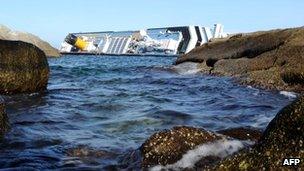Costa Concordia disaster: Cruise firm faces US lawsuit
- Published

Costa Cruises has blamed the ship's captain, who denies responsibility, for the incident
The company operating a cruise ship that ran aground off Italy is facing a class-action lawsuit in the US.
Italy's consumer association Codacons and two US law firms told the BBC they would file the suit against Costa Cruises on behalf of the passengers.
They want at least $160,000 (£105,000) for each passenger on the ship.
Meanwhile officials say the search for 21 people still missing after the disaster will continue until the whole ship has been searched.
The rescue operation continued overnight in dry parts of the Costa Concordia.
Divers are now going into submerged parts at depths of up to 14m with explosives to open up previously unsearched areas.
Reports say the grounded vessel is shifting at a rate of a few millimetres per hour.
The BBC's Luisa Baldini on the nearby island of Giglio says there is a real fear that it may topple off the rocky shelf where it is currently sitting.
If it slips into deeper water, fuel tanks could rupture threatening one of the most unspoilt parts of the Mediterranean.
'Grave errors'
Costa Cruises, owned by US-based Carnival Group, has blamed the ship's captain for last week's crash, in which at least 11 people were killed.
The Costa Concordia hit rocks off the coast of the Tuscan island of Giglio with more than 4,200 people on board a week ago. Hundreds were injured.
Relatives of victims are expected to come to Giglio, which is being visited by Senate President Renato Schifani, the number two in the Italian government.
Mitchell Proner, a lawyer with Proner & Proner, said: "Along with Codacons, we have formed an association and our firms are collectively going to be filing a suit in Miami, by Wednesday next week, on behalf of all the victims of the Costa Concordia disaster."
Mr Proner said claimants would be seeking compensation for continued medical care, loss of earnings as well as the psychological impact they had suffered while trying to get off the ship.
He said that some of the claimants - currently 110 - would seek two or three times the minimum claim, while the worst cases could seek as much as 1m euros.
Costa Cruises said it was open to the concerns of all consumer associations and individual passengers.
"The company understands those concerns and will respond in due course, but for now, it wants to concentrate on dealing with the immediate tragedy," said a spokesman for the company.
"As an initial gesture, it has already sent letters to all those passengers on board asking them to detail their expenses and any costs they might have incurred so reimbursements can be made."
The firm has blamed Capt Francesco Schettino for committing "grave errors of judgement" by steering the ship too close to Giglio on an "unauthorised manoeuvre".
Capt Schettino is currently under house arrest suspected of manslaughter, which he denies.
The firm has begun the process of launching a civil claim against him in Italy. But Mr Proner said that the firm could not pin all responsibility for the disaster on a "rogue captain".
"It's easy to say this captain acted alone," he said.
"There are indications that there have been regular route deviations in the past. There should have been safeguards on board, where were the alarms?
"At the time of the Titanic it might have been easy to say that radars didn't exist. Nowadays, with all the technology, it isn't. There had to be a failure in the system that allowed this to happen."
'Protecting rights'
The president of Codacons, Marco Ramadori, said Costa Cruises' offer was insufficient.
"They are offering to refund the cost of the ticket as if you had missed a plane and lost your luggage. You cannot compare the two," he said.
Costa passengers are reported to have signed a contract when buying their cruise tickets that any litigation would have to be pursued under Italian law.
But Mr Proner said that he thought it likely that the US courts would accept the case.
"The US has a long tradition of protecting rights and not only is Costa owned by an American company but they have brought themselves into our stream of commerce," he said.
"There were 120 Americans on board and they will demand access to their rights," he said.